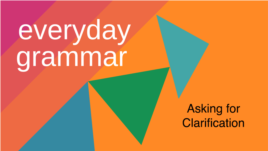04 January, 2019
Modal verbs are helping verbs. We use them with main verbs to help us express ability, possibility, necessity and permission. Today's question is about a modal that is commonly confused with an expression. Here's the question, which comes from a listener named Cafer:
Question
Hi! Would you like to explain the difference between "can" and "be able to"? Thank you. -Cafer Özcan
Answer
Hi, Cafer!
I can explain the differences between the two.
I just used "can" to talk about my ability to do something. We also use "be able to" for abilities, but usually only when "can" is not possible. I'll tell you what that means in a minute.
But first, let's explore the word "can."
Can
"Can" is a modal verb. We use it to:
- talk about present or future ability or possibility
I can play the guitar.
You can buy the tickets online.
You must use "could" for the past tense, such as in, "You could have bought the tickets online."
We also use "can" to:
- ask for or give permission
I am finished. Can I go now?
Yes, you can. - and to ask someone to do something
Can you bring me the magazine?
Be able to
Now, let's explore "be able to."
This expression is not a modal. It is the verb "to be" plus the adjective "able." The word "to" shows that an infinitive verb will follow.


We use "be able to":
- when it is not possible to use "can" for abilities, such as after other modal verbs
I won't be able to take you to the train station. Sorry!
You should be able to finish the book in a few days.
The words "won't", short for "will not", and "should" are modals. In English, we do not put two modals together. So, we cannot put "can" after them.
We also use "be able to":
- to talk about small or large past successes.
We were able to get a great price on the television.
She was able to win the math competition last month.
- But in negative form, we can use "be able to" or "could":
We couldn't get a great price on the television.
She wasn't able to win the math competition last month.
But note that the negatives "wasn't able to" and "weren't able to" are a little more formal than "couldn't."
And that's Ask a Teacher.
I'm Alice Bryant.
Do you have a question for Ask a Teacher, write to us in the comments area. Be sure to tell us what country you are from.
Words in This Story
confuse – v. to make someone unable to understand something
guitar – n. a musical instrument that is held against the front of your body and that has six strings
infinitive – n. the basic form of a verb
negative – adj. describing a word or statement that means "no" or that expresses a denial or refusal










